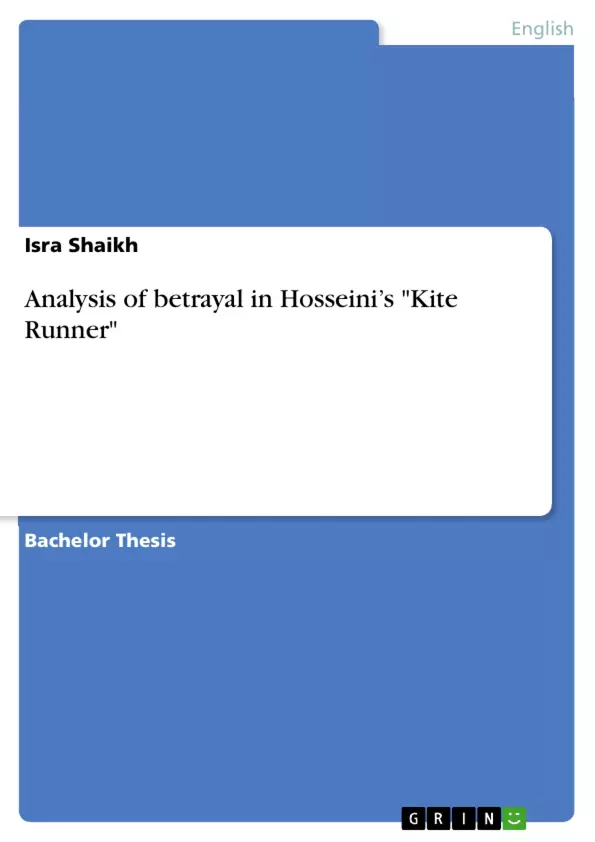After having the exhaustive research of this novel, I construe this novel as the finest case to outline the components of betrayal in human nature. Khaled Hosseini is one of the Afghan migrants who studied in Los Angeles and chosen to noticeably a built up author. He published his first novel, The Kite Runner, and gets positive react for his first novel from American public. Hosseini’s, Kite Runner which was published in 2003 displays new thought furthermore, shading, complexity of conflict toward friendship. It revolve around the theme of betrayal in friendship. Hosseini uncovers a well-past due understanding into a pre-war Afghanistan, through the lives of two young boys and their families. The kite runner is a gripping and emotional tale of love, betrayal and redemption.
Table of Contents
- Chapter 1: Introduction
- 1.1 Background
- 1.2 Objectives of the Research
- 1.3 Research Questions
- 1.4 Significance of the Research
- Chapter 2: Literature Review
Objectives and Key Themes
This research analyzes the theme of betrayal in friendship, specifically within the context of Khaled Hosseini's novel, The Kite Runner. The study aims to understand the nature and impact of betrayal on relationships, examining how betrayal is portrayed between the novel's two main characters, and exploring the extent to which one character views the other as a true friend.
- Betrayal in friendship
- The nature and impact of betrayal
- Analysis of character relationships in The Kite Runner
- Exploration of loyalty and its absence
- The consequences of betrayal on individuals and relationships
Chapter Summaries
Chapter 1: Introduction: This chapter introduces the research topic—betrayal in friendship as depicted in Khaled Hosseini's The Kite Runner. It establishes the context by discussing betrayal's historical presence in literature and human interactions, citing examples from Shakespearean tragedies and Greek mythology. The chapter then lays out the research objectives and questions, focusing on the relationship between Amir and Hassan. The significance of the study is highlighted by emphasizing the pervasive nature of betrayal and the need to understand its impact on relationships. The author's goal is to analyze the dynamics of friendship and betrayal, linking the novel’s themes to Betrayal Trauma Theory.
Chapter 2: Literature Review: This chapter explores the existing scholarship on betrayal, primarily focusing on its representation in literature. It references Shakespeare's works, highlighting how betrayal is portrayed within various friendships. The chapter emphasizes the devastating consequences of betrayal, underscoring its impact on both the victim and perpetrator. The review contextualizes Hosseini's The Kite Runner by connecting its thematic exploration of betrayal to the broader literary and philosophical discussions surrounding this universal human experience. The chapter sets the stage for a deeper analysis of betrayal in the novel itself by providing a foundational understanding of the concept.
Keywords
Betrayal, friendship, The Kite Runner, Khaled Hosseini, loyalty, trust, human relationships, betrayal trauma theory, literary analysis, character analysis.
Frequently Asked Questions: A Comprehensive Language Preview
What is the main topic of this research?
This research analyzes the theme of betrayal in friendship, specifically within the context of Khaled Hosseini's novel, The Kite Runner. It aims to understand the nature and impact of betrayal on relationships, examining how betrayal is portrayed between the novel's two main characters, and exploring the extent to which one character views the other as a true friend.
What are the key themes explored in this research?
Key themes include betrayal in friendship, the nature and impact of betrayal, analysis of character relationships in The Kite Runner, exploration of loyalty and its absence, and the consequences of betrayal on individuals and relationships.
What is included in the Table of Contents?
The Table of Contents includes Chapter 1: Introduction (covering background, research objectives, research questions, and significance) and Chapter 2: Literature Review.
What are the objectives of this research?
The research aims to understand the nature and impact of betrayal on relationships, specifically focusing on the relationship between Amir and Hassan in The Kite Runner. It seeks to analyze the dynamics of friendship and betrayal, linking the novel’s themes to Betrayal Trauma Theory.
What is the scope of the literature review?
The literature review explores existing scholarship on betrayal, focusing on its representation in literature, particularly in Shakespeare's works. It connects Hosseini's The Kite Runner to broader literary and philosophical discussions surrounding betrayal.
What are the key findings or arguments presented in Chapter 1?
Chapter 1 introduces the research topic, establishes context by discussing betrayal's historical presence in literature and human interactions, lays out research objectives and questions, and highlights the significance of studying betrayal's impact on relationships.
What are the key findings or arguments presented in Chapter 2?
Chapter 2 explores existing scholarship on betrayal, referencing Shakespeare and other literary examples. It contextualizes The Kite Runner within the broader discussion of betrayal, setting the stage for a deeper analysis of the novel.
What are the keywords associated with this research?
Keywords include: Betrayal, friendship, The Kite Runner, Khaled Hosseini, loyalty, trust, human relationships, betrayal trauma theory, literary analysis, character analysis.
What theoretical framework is used in this research?
The research utilizes Betrayal Trauma Theory to analyze the dynamics of friendship and betrayal in The Kite Runner.
What is the significance of this research?
The research emphasizes the pervasive nature of betrayal and the need to understand its impact on relationships. By analyzing The Kite Runner, it contributes to a deeper understanding of betrayal's consequences on individuals and relationships.
- Quote paper
- Isra Shaikh (Author), 2017, Analysis of betrayal in Hosseini’s "Kite Runner", Munich, GRIN Verlag, https://www.grin.com/document/459010



